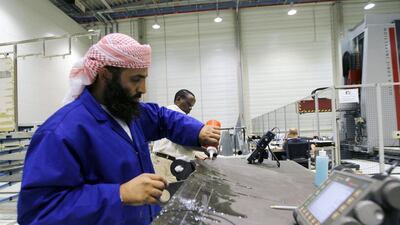The news that Strata, a manufacturing company owned by Mubadala, is to create 600 jobs at a second plant in Al Ain is the part of the story that made headlines. But it is the type of jobs being created that is worthy of further comment.
Strata already works with Boeing and Airbus but intends to expand, both in the UAE and abroad. Taken along with other industries – for example, the nuclear reactors being built at Barakah in the western region – the end result will be thousands of new jobs in high-tech industries.
These are the jobs that will provide what might be called the new blue collar jobs of the future. Historically, in industrial societies, “blue collar” signified jobs involving manual labour, whereas “white collar” signified office-based jobs. As the cost of manual labour in the rich world grew, most manufacturing jobs moved overseas.
The UAE does not need traditional blue collar jobs, but newer, more skilled ones that still involve an element of manual or technical skill. But these jobs require a highly trained workforce, the sort educated in information technology, biotechnology and nuclear technology. These are technically-intensive industries and they are the sort of jobs that will appeal to a wide range of people across the UAE.
Coupled with excellent technical education – something this newspaper has previously argued for – the goals of Emiratisation could be met across these industries, from the leadership, the managers and the technical staff.
The best example of a developed country that has maintained a manufacturing base is Germany, which has weathered the global economic crisis well and still has significant manufacturing industries – around 20 per cent of the economy. It has done this through a joined-up approach between government, educational institutes and the private sector. Piece by piece, this sort of thinking is being assembled in the UAE.

